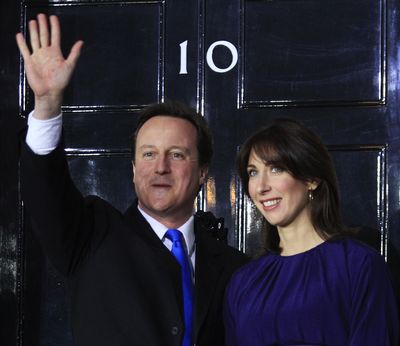Cameron becomes PM
Clegg now deputy in British coalition

LONDON – David Cameron, the youthful leader who modernized the party of right-wing icon Margaret Thatcher, became prime minister Tuesday after the resignation of Gordon Brown – capping a gripping election saga that returns the Tories to government after 13 years of Labour Party rule.
Following tradition, Queen Elizabeth II appointed Cameron at Buckingham Palace – a stately denouement to a behind-the-scenes dogfight between Cameron and Brown for the cooperation of Britain’s third-place party, after an election that left no party with a majority.
Within minutes, the 43-year-old Cameron was installed at No. 10 Downing Street, becoming the youngest prime minister in almost 200 years, since Lord Liverpool took office at age 42.
An announcement followed that Liberal Democrat leader Nick Clegg would become deputy prime minister – a rarely awarded and prestigious post – after days of hard bargaining with his former political rivals. Four other Liberal Democrats also received Cabinet posts.
Cameron and Clegg agreed to form a coalition after Cameron’s Conservative Party won the most seats in Britain’s May 6 national election, but fell short of winning a majority of seats in Parliament. The agreement, reached over five sometimes tense days of negotiation, delivered Britain’s first full coalition government since World War II.
“Nick Clegg and I are both political leaders who want to put aside party differences and work hard for the common good and for the national interest,” Cameron said.
Britain’s new government could spell changing relationships with its foreign allies.
Both Cameron and Clegg have signaled they favor looser ties to Washington than those held by Brown and his predecessor, Tony Blair. Cameron and Clegg back the Afghanistan mission but Cameron hopes to withdraw British troops within five years. Clegg has said he’s uneasy at a rising death toll.
Relations with European neighbors could also become problematic. Cameron’s party is deeply skeptical over cooperation in Europe, and has withdrawn from an alliance with the parties of Germany’s Angela Merkel and France’s Nicolas Sarkozy. Clegg, once a member of the European parliament, has long been pro-European.
The Conservative Party said ex-leader William Hague will serve as Foreign Secretary, senior lawmaker George Osborne as Treasury chief, and lawmaker Liam Fox as defense secretary. Other leading positions were being finalized, as were key policy decisions ahead of the presentation of the coalition’s first legislative program on May 25.
The coalition has already agreed on a five-year, fixed-term Parliament – the first time Britain has had the date of its next election decided in advance. Both parties have made compromises, and Cameron has promised Clegg a referendum on his key issue: Reform of Britain’s electoral system, aimed at creating a more proportional system.